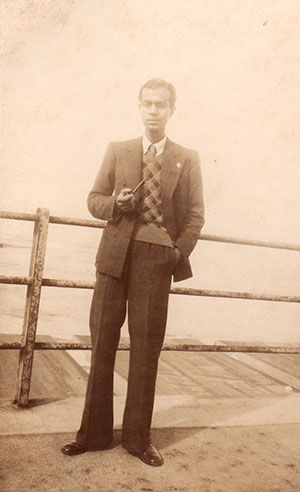In 1942, he made a drastic decision, which many people believed to have had a negative influence upon his fame in the writing career. He decided to move to the newly founded then, University of Alexandria for no reason other than the fact that he had always been in love with that city by the sea and found it to be incredibly inspiring. "The Nile has two shores" said Eassa, "but the sea has one shore looking onto infinity!" Moving to Alexandria was moving away from the Cairo centralization of media, away from publishing houses and publishers, who, in the third world, always require continuous nagging from writers.
Cairo centralization, yet, back then in 1942 was not so strongly felt like how it had become later in the sixties and onwards. However, this decision to move to Alexandria, has now become a positive point in Eassa's favour, for it confirms that whatever prestige he attained as a writer was due to the quality of his art and the intensity of his talent. Such a talent that broke the third world rules and made its way to the capital without pursuing and nagging. It was the magazines, newspapers and the Cairo Radio that pursued him to Alexandria. However, had he been residing in Cairo, he would have still got much more attention from the media and his published works in book form would have definitely appeared much earlier. More significant even, was that translations of his works would have come out. The appearance of such translations could have made drastic changes, for in the early eighties of the 20th century, a Nobel authority member came to Egypt to select names for the Nobel Nomination in literature. Eassa's name was among three Egyptian names, and it was the absence of translations that stood as a barrier.
In 1948, he traveled to England , Sheffield University to obtain his Ph.D. His stay in Sheffield happened to be the happiest time in his life. It had a strong impact on his personality and amazingly gave him the confidence he needed as a writer and not just as a scientist. Two people were responsible for this confidence: his supervisor Professor Eastham and his Ph.D. examiner Professor Wigglesworth; the eminent scientist, who was considered in the field of Zoology to almost rank Einstein in mathematics.

The subject of his thesis was "Butterflies". On the day of the thesis discussion, Professor Wigglesworth's exact words were: "I have examined hundreds of Ph.D. degrees. Not a single one interested me, impressed me and inspired me like this one has." Furthermore, Prof. Wigglesworth was highly impressed with Eassa's artistic illustrative drawings in the thesis. Eassa's supervisor, Professor Eastham later told him, "Thank you. You are an artist, Youssef, and I believe that a scientist should be an artist." Those words had a most significant impact upon Youssef Ezeddin Eassa, who had always been before somewhat uncomfortable with being acknowledged as a writer. Back at home science and art were looked upon as two opposites and he was made to feel through some colleagues that he had betrayed his scientific career. Personally, he never believed in any contradiction between science and art, and the words of Eastham confirmed this belief.
Writing was always something he could not resist. It was always imposing itself on his life, and so his literary writings went on during his stay in England. He wrote a number of dramas and stories that were broadcast on the BBC, third program, then. He always received a "Thank you" letter from the BBC for his writings.
During his stay in England, Eassa met with some quite interesting and remarkable figures. He visited Bernard Shaw, at his home, once for tea. Eassa remembered Bernard Show as a great and modest man. "Show prepared the tea himself and we had an interesting chat. He told me, "When I was young, I believed that I was greater than Shakespeare. Later, I felt we were almost equal and now, I think that Bernard Show has done nothing at all". Eassa commented on this saying "I learnt then that great men are very modest."
Among other acquaintances was Professor Krebs, (Noble awarded in Biochemistry), who was his favourite companion during coffee breaks at Sheffield University and their favourite topic had always been art and literature. Eassa later wrote in the Egyptian papers various articles about his stay in Sheffield expressing admiration for the place and its people.
In 1960, he was selected by the Fullbright Organization to be a Visiting Professor in the United States for one year ( Berkeley and Illinois Universities ). Among the reasons he was chosen was the fact that he was an eminent writer together with being a professor; something that was intellectually esteemed by the Fullbright Authorities, thus confirming the words of Professor Eastham about art and science.